|
|
|
Sort Order |
|
|
|
Items / Page
|
|
|
|
|
|
|
| Srl | Item |
| 1 |
ID:
193297


|
|
|
|
|
| Summary/Abstract |
The term disruption has become a buzzword for our times, although there is little clarity over what the term means, how it is deployed, and towards what ends. In order to understand the analytical and political stakes that are embedded in the deployment of ‘disruption’ as a rationale for various sources of upheaval, in this article I argue that these three terrains of disruption should be understood as theories of governance, and term them ‘disruption from above’, ‘disruption from the middle’, and ‘disruption from below’. Each terrain of disruption embodies different ethoses, actors, and goals: the first connoting elite-driven creative destruction and innovation; the second obfuscating the capitalist imperative that produces world-systemic upheavals; and the third seeking to expose the structures of violence and inequality built into such practices. I illustrate these three terrains through a structural account that traces the popularity of the disruption discourse from its origins to its material application; analyse an illustrative example of the assetisation of infrastructure and how it bureaucratises governance and shifts relations of power; and conclude by examining infrastructural forms of protest against such forms. I argue that the confusion over what disruption means, who exercises it, and upon whom is not a coincidence: rather, disruption's polysemy is structurally produced as a way to disguise ongoing capitalist crisis as a technical problem that market innovations can solve.
|
|
|
|
|
|
|
|
|
|
|
|
|
|
|
|
| 2 |
ID:
157696
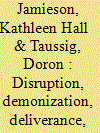

|
|
|
|
|
| Summary/Abstract |
KATHLEEN HALL JAMIESON and DORON TAUSSIG examine Donald Trump’s rhetoric during the presidential campaign and through his first 100 days in office. They argue that Trump’s “rhetorical signature,” which distinguishes him from his predecessors, certified Trump’s authenticity as a candidate of change and now complicate his ability to govern.
|
|
|
|
|
|
|
|
|
|
|
|
|
|
|
|
| 3 |
ID:
176831
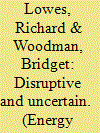

|
|
|
|
|
| Summary/Abstract |
The decarbonisation of heating represents a transformative challenge for many countries. The UK's net-zero greenhouse gas emissions target requires the removal of fossil fuel combustion from heating in just three decades. A greater understanding of policy processes linked to system transformations is expected to be of value for understanding systemic change; how policy makers perceive policy issues can impact on policy change with knock-on effects for energy system change. This article builds on the literature considering policy maker perceptions and focuses on the issue of UK heat policy. Using qualitative analysis, we show that policy makers perceive heat decarbonisation as disruptive, technological pathways are seen as deeply uncertain and heat decarbonisation appears to offer policy makers little ‘up-side’. Perceptions are bounded by uncertainty, affected by concerns over negative impacts, influenced by external influences and relate to ideas of continuity. Further research and evidence on optimal heat decarbonisation and an adaptive approach to governance could support policy makers to deliver policy commensurate with heat decarbonisation. However even with reduced uncertainty and more flexible governance, the perceptions of disruption to consumers mean that transformative heat policy may remain unpopular for policy makers, potentially putting greenhouse mitigation targets at risk of being missed.
|
|
|
|
|
|
|
|
|
|
|
|
|
|
|
|
| 4 |
ID:
177368
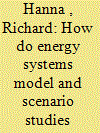

|
|
|
|
|
| Summary/Abstract |
Scenarios may be qualitative or quantitative, the latter of which can be developed using energy systems models. This study explores how different energy systems models and scenarios explicitly represent and assess potential disruptions and discontinuities. The focus is on futures studies and forward-looking scenario and modelling exercises. We apply definitions of ‘emergent’ (uncoordinated) and ‘purposive’ (coordinated) disruption to a systematic review on how energy systems models and scenarios have been used to capture disruption and discontinuity. We first conducted a review of reviews of energy models and scenarios to provide an overview of their common classifications. Additional searches then sought studies which use different types of models and scenarios to explore disruption and discontinuity. We analyse a subset of 30 of these modelling or scenario studies in which authors self-identify and represent disruption or discontinuity, finding that the most frequently used methods were qualitative, exploratory foresight scenarios or agent-based models. We conclude that policy makers could prepare more effectively for social, economic and political disruption by integrating multidisciplinary insights from social and political sciences, engineering and economics through a broader range of methods: exploratory, foresight scenarios, simulation and agent-based models and repurposed energy systems optimisation models.
|
|
|
|
|
|
|
|
|
|
|
|
|
|
|
|
| 5 |
ID:
193295
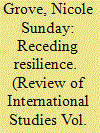

|
|
|
|
|
| Summary/Abstract |
The term disruption has been offered as both an ethos and set of practices framed as a broad response to all manner of social and political ills. This article offers a speculative reflection on disruption as a planetary mood, and the sensory qualities of a change in politics no longer defined by governance and what is governable, but by a series of continuous experiments hedged upon the creation of new geopolitical frontiers and life forms that position all matter and contingency towards a specific kind of value tied to chaos. In thinking about the kinds of authority and legitimacy being fashioned around visions of so-called disruptive futures, I draw on materially-grounded illustrations of disruptive dispositions to examine three different arrangements of affect, feeling, and intensity being animated to give disruption its power of transmissibility and adaptability, as well as its unintuitive emphasis on disorder and ‘breaking things’ as both a moral good and unconditional response to questions concerning global conflict, crises, and instability. Ultimately, disruption as a planetary mood draws on a libidinal economy that does not bend towards justice or equity, thus warning against misanthropic commitments to collapse and the consequences of investing in a world premised on an ethos of erasure.
|
|
|
|
|
|
|
|
|
|
|
|
|
|
|
|
| 6 |
ID:
195304


|
|
|
|
|
| Summary/Abstract |
Disruption and mess associated with energy efficiency retrofits is one aspect that is rarely considered in studies investigating households’ preferences for energy renovations. Using a choice experiment, we estimate a price for residential retrofit disruption, finding it represents a substantial proportion of associated energy cost savings among some households. There is considerable variance in willingness to pay for both energy cost savings and disruption avoidance, consistent with experience of many households investing in energy retrofits but also of government retrofit schemes falling far short of policy targets. Just 1-in-4 households are actively receptive to retrofit policy supports, and disruption posing a significant barrier to undertaking energy retrofits, means both contribute to the slow progress against public policy targets to improve residential energy efficiency.
|
|
|
|
|
|
|
|
|
|
|
|
|
|
|
|
| 7 |
ID:
176720
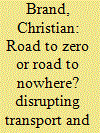

|
|
|
|
|
| Summary/Abstract |
The phasing out of conventional fossil fuel road vehicles is one of a number of potentially disruptive transport and energy policies. The implied technical substitution alone may be too slow to contribute meaningfully to meeting ‘net zero’ carbon reduction targets. This paper uses established modelling techniques and prospective scenario analyses in a UK case study to investigate what the impacts might be if we were more ambitious, how much disruption is needed to meet climate goals, the role of lifestyle and social change, and the potential implications for key actors in transport energy systems. Existing policies may neither hit carbon reduction targets nor make the early gains needed for a Paris-compliant trajectory. Deeper and earlier reductions in carbon and air quality emissions can be achieved by more ambitious but largely non-disruptive change of a 2030 phase out that includes (plug-in) hybrids. The earlier phase outs combined with lower demand for mobility and car ownership would make significant contributions to an emissions pathway that is both Paris compliant and meets urban air quality goals. Some disruption for technology providers, business and government can be expected in the more ambitious cases. The paper concludes by discussing key policy implications and recommendations.
|
|
|
|
|
|
|
|
|
|
|
|
|
|
|
|
| 8 |
ID:
177168
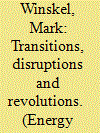

|
|
|
|
|
| Summary/Abstract |
Alongside ambitious targets for economy-wide decarbonisation, a ‘smart and local energy revolution’ narrative has recently emerged in energy policy and research. To consider the energy revolution proposition, this paper presents findings from a Policy Delphi survey of interdisciplinary energy researchers and stakeholders (n = 113) on alternative transition paths (disruptive or continuity-led) for the UK energy system. The paper includes quantitative and qualitative survey findings on a number of social and technical aspects of the energy revolution proposition: system governance, security and flexibility arrangements, power sector decarbonisation, the future of large supply firms and energy policy priorities. The results suggest that rather than a wholesale revolution the UK's energy transition over the next two decades will involve a mix of disruptive and continuity-led elements. Experts differ on a number of issues associated with the energy revolution proposition, including the impact of demand side response on whole system flexibility and whether energy systems are best governed at a local or national scale. However, rather than having fixed orientations to either disruption or continuity-led change, most experts respond on an issue-by-issue basis. The energy revolution proposition is socially constructed and contestable, and whole energy systems policy and research should go beyond uniform transition narratives.
|
|
|
|
|
|
|
|
|
|
|
|
|
|
|
|
| 9 |
ID:
143310
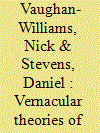

|
|
|
|
|
| Summary/Abstract |
Citizens increasingly occupy a central role in the policy rhetoric of British National Security Strategies, and yet the technocratic methods by which risks and threats are assessed and prioritized do not consider the views and experiences of diverse publics. Equally, security studies in both ‘traditional’ and ‘critical’ guises has privileged analysis of elites over the political subject of threat and (in)security. Contributing to the recent ‘vernacular’ and ‘everyday’ turns, this article draws on extensive critical focus-group research carried out in 2012 across six British cities in order to investigate (1) which issues citizens find threatening and how they know, construct and narrate ‘security threats’, and (2) the extent to which citizens are aware of, engage with and/or refuse government efforts to foster vigilance and suspicion in public spaces. Instead of making generalizations about what particular ‘types’ of citizens think, however, we develop a ‘disruptive’ approach inspired by the work of Jacques Rancière. While many of the views, anecdotes and stories reproduce the police order, in Rancière’s terms, it is also possible to identify political discourses that disrupt dominant understandings of threat and (in)security, repoliticize the grounds on which national security agendas are authorized, and reveal actually existing alternatives to cultures of suspicion and unease.
|
|
|
|
|
|
|
|
|
|
|
|
|
|
|
|
|
|
|
|
|